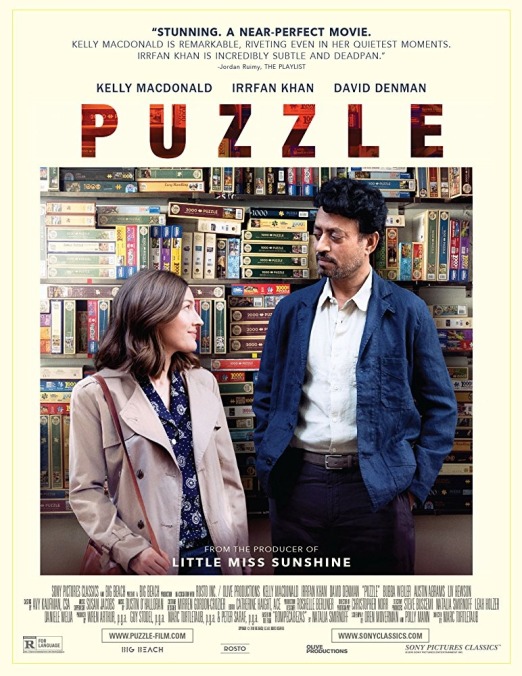The quiet charms of Kelly Macdonald and Irrfan Khan aren't enough pieces for Puzzle

In what year does the quiet, deliberate Puzzle take place? There are little clues—a teenager with a Stankonia poster on his wall; a fortysomething woman who still uses a landline; a father who thinks there’s something suspiciously non-manly about the idea of a male chef—that accumulate for a while, seeming to vaguely indicate the mid-2000s, until eventually it becomes clear that the movie is supposed to be happening more or less in the present day. It’s just that the world of Agnes (Kelly Macdonald), the aforementioned landline user, hasn’t changed much over the last couple of decades.
Agnes is a Catholic homemaker living in Bridgeport, Connecticut. She married Louie (David Denman) young, neither of them went to college, and now they have two nearly-grown sons: high school senior Gabe (Austin Abrams) and his older brother Ziggy (Bubba Weiler), who is college-aged but toils unhappily at Louie’s car repair shop instead of pursuing higher education. She cooks dinner, she goes to church group meetings, and she occasionally helps her husband with the books on his struggling business. Early in the film, the family gives Agnes an iPhone for her birthday, adding it to a list of things she doesn’t fully understand: veganism, Buddhism, the process of traveling from Bridgeport to Manhattan (even though she lives near a Metro North stop), and the mechanics of buying a second jigsaw puzzle after receiving her first as another birthday gift.
It turns out that Agnes is something of an untapped puzzle master, putting together 1,000 pieces in the space of an afternoon, and finding a strange, unfamiliar satisfaction in the process. When she heads to a New York puzzle shop in search of another fix, she finds and answers an ad placed by Robert (Irrfan Khan), seeking a doubles partner for a puzzle tournament. Soon she is secreting into Manhattan twice weekly to train, and two reliable character actors (and Danny Boyle veterans) get substantial screen time as they regard each other warily, then warmly, and then with feelings that may complicate both their lives, especially Agnes’s.
The scenes between Macdonald and Khan brings the best out of both actors, neither prone to emotive showboating. They’re both subtly expressive, and moreso when they’re playing opposite each other for scenes that play like pieces of a two-hander that never fully materializes. Both Agnes and Robert are eccentrics of sorts, but Robert is far more comfortable with that distinction. He’s relaxed, she’s a little skittish, and their conversations don’t have the condescension she receives from her affectionate but complacent husband.
Puzzle depicts that sheltering, stifling experience by setting a lot of scenes in her home. The movie’s canniest (and maybe only) surprise comes early: After an opening series of backlit shots of Agnes carefully preparing and dutifully attending a birthday party, it eventually reveals that it’s her birthday, not her husband’s. This would be more than enough information about the place Agnes holds in her family, but the movie proceeds with more dour, borderline miserablist domestic drama, and never really bothers with the specifics of its nominal subject, competitive puzzling. It’s clear that Agnes is an unusually fast puzzler, but the movie remains mum about what constitutes a champion-level time, or what weaknesses Agnes and Robert might hold in competition.
It’s easy enough to imagine a cutesier alternate version of this story that would have starred, say, Judi Dench and Billy Nighy, and may have even been produced by Marc Turtletaub, the director of Puzzle who has also produced a number of accessible indie features including Little Miss Sunshine, Safety Not Guaranteed, Away We Go, and Sunshine Cleaning. But this movie, Turtletaub’s second try at feature directing, isn’t a small-scale crowdpleaser like any of those. It’s hard to fault Puzzle for going in a more rigorous, serious-minded direction… until it trudges in that direction with such repetition. Turtletaub and his screenwriters lay the borderline-anachronistic details of their heroine’s oppressive life on so thick that the movie starts to sag.
It also fails to show what it is about Agnes that so attracts Robert, beyond her being played by Macdonald; when his list of compliments for her includes “funny,” he starts to sound downright delusional. When Puzzle steps back, it leaves space for a sweet intimacy to develop between its overqualified leads. Too often, though, it strains for kitchen-sink profundity, right through an ending that crams together images of Macdonald at various metaphorical crossroads, searching in vain for an evocative final shot.